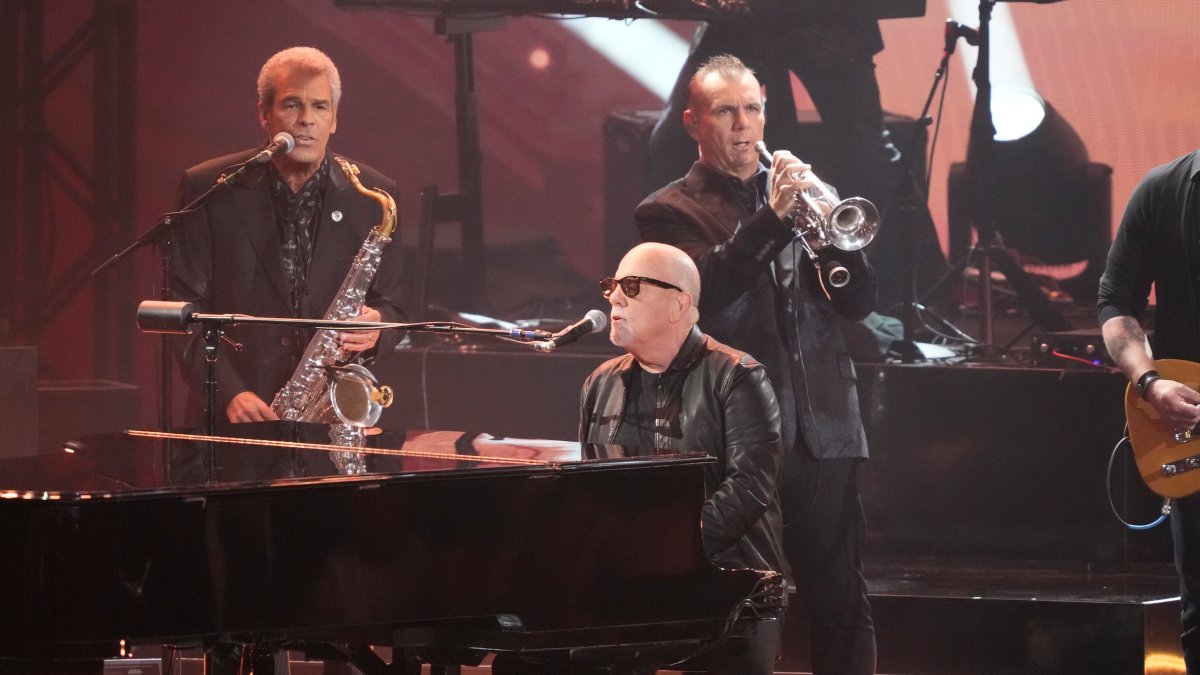Billy Joel is a music icon, a beloved singer-songwriter whose singles, from ballads like “Piano Man” to upbeat hits like “It’s Still Rock and Roll to Me,” continue to thrill generations of fans.
But he came close to never becoming that legendary musician, never realizing his full potential, never even surviving his 20s.
In the first installment of the two-part HBO documentary “Billy Joel: And So It Goes,” the 76-year-old entertainer and those closest to him open up about a dark time in his life. A time when, after betraying his best friend, he was wracked with guilt and attempted suicide twice.
Singer Billy Joel and drummer Jon Small of the rock band “Attila” pose for a portrait in 1970. (Photo by Michael Ochs Archives/Getty Images)
The friend was Jon Small, Joel’s bandmate in a late ‘60s group called The Hassles, his partner in a 1970 two-man act called Attila and his then-roommate.
Small’s wife, Elizabeth Weber, and their young son were also part of the same household, and over time, Joel and Weber began an affair.
When Small sensed something was off, Joel confessed what was happening.
“Something was the matter, and Billy, one day, came up to me and became honest to me,” Small recalled in the documentary. “He said to me, ‘I’m in love with your wife.’”
Small responded to that with a punch, and what followed was the end of a band, the end of a marriage, the (temporary) end of a friendship and the beginning of deep and devastating depression for Joel.
“I felt very, very guilty about it,” Joel explained in the documentary. “They had a child. I felt like a home wrecker.”
Weber left both men. And Joel, without a home of his own, began drinking heavily.
“I was depressed, I think to the point of almost being psychotic,” he said of that time. “So, I figured, ‘That’s it. I don’t want to live anymore.’ I was just in a lot of pain, and it was sort of like, ‘Why hang out? Tomorrow is going to be just like today is, and today sucks.’ So, I just thought I’d end it all.”
Joel even involved his sister, a medical assistant, in his plan, though she had no idea what he intended to do when he asked her for sleeping pills. She told him to take one or two at night to help him rest.
“Billy decided that he was going to take all of them,” his sister, Judy Molinari, remembered through tears in the documentary. “He was in a coma for days and days and days. I went to go see him in the hospital, and he was laying there white as a sheet. I felt that I’d killed him.”
When Joel woke up, he said his first thought was, “I couldn’t even do this right.” His suicidal ideation continued, and as soon as he left the hospital, he tried again.
“Billy was still depressed after that,” Molinari continued. “He was at my mother’s house, and this time he drank a bottle of Lemon Pledge.”
It was after that second attempt, Joel got help from an unlikely savior. Small, the estranged friend he betrayed, came to his rescue.
“I was the one that had to get him in the hospital,” Small said.
After that, Small reflected on why everything that had happened between them seemed to be the catalyst that drove Joel to such extremes.
“The only practical answer I can give to why Billy took it so hard was because he loved me that much, and that it killed him to hurt me that much,” he explained.
Small went on to forgive Joel, and eventually, Joel showed himself some compassion, too.
Feeling like a “lost soul,” Joel decided to get psychiatric help, turned his life around and channeled those dark days into the music that led to his solo career.

Billy Joel and wife Elizabeth Weber circa 1981 in New York City. (Photo by Robin Platzer/Images/Getty Images)
As for Elizabeth Weber, she and Joel later rekindled their romance and wed in 1973. They divorced nine years later.
This article first appeared on TODAY.com. More from TODAY:
Billy Joel is canceling all scheduled concerts through the summer of 2026 after being diagnosed with a brain disorder, according to a statement posted to the singer’s social media accounts.



